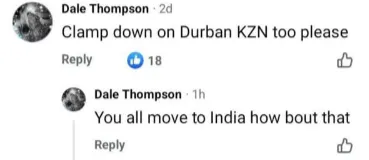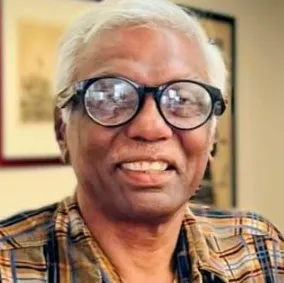
A screengrab of a Facebook post by Dale Thompson reads: "You all move to India how bout that.'
Image: Facebook
EACH Diwali, the Festival of Lights, millions of South Africans of Indian origin celebrate the triumph of light over darkness, of knowledge over ignorance, and of good over evil. Yet, as calls grow for Diwali to be recognised as a public holiday, a jarring chorus has emerged from the shadows, voices saying, “Go back to India.”
It is a bitter irony. Thirty-one years into democracy, such words still echo across social media and in public discourse, careless, racist, and deeply hurtful. They betray not only a lack of respect, but a painful absence of historical knowledge.
Indians have been part of the South African story since 1652, long before the formal arrival of indentured labourers in 1860. Generations were born here, worked the sugar cane fields, built businesses, served in schools and hospitals, and fought in liberation movements. South Africa is not just their home, it is the land watered by their ancestors’ sweat, struggle, and sacrifice.
When people say, “Go back to India,” they are not speaking to foreigners. They are speaking to fellow South Africans who have lived, toiled, and dreamed here for centuries.
As Nelson Mandela reminded us, “No one is born hating another person because of the colour of his skin or his background or his religion.” Hate is learned, and therefore, it can be unlearned.
I attribute these hurtful comments to the poverty of historical understanding.
I grew up in Mayville, a working-class community where my father was a waiter and my mother a home-based dressmaker. We lived modestly, but we lived with dignity, and with neighbours of all races and religions. We shared meals, borrowed sugar from each other, and celebrated each other’s joys. In those small, human moments, I saw the real South Africa, one built not on race, but on relationship.
That is why it pains me today to see social media filled with hostility and ignorance. Too few know of Ahmed Kathrada's 25 years of imprisonment in South Africa, or of Dr Monty Naicker, Fatima Meer, Dr K Goonam, Dr Yusuf Dadoo, and Mewa Ramgobin and others, who stood shoulder to shoulder with African leaders in the struggle for liberation. Too few recall that hundreds of Indians were jailed, banished, or killed fighting apartheid, not as outsiders, but as patriots The Indian community’s history is intertwined with that of South Africa itself. Our forebears fought not for special status, but for a society where no one would be judged by race or creed.
The danger of division is that it has the capacity to incite discord in society. Racism today wears new disguises. It hides behind online jokes, political rhetoric, and careless speech. It is as corrosive in an Indian who looks down on other races as it is on a person of another race who mocks Indian culture or religion.
We must say this plainly: prejudice is prejudice, no matter who practices it. And its ultimate victim is not a single race or religion, but the idea of South Africa itself.
When people mock the proposal to make Diwali a public holiday (or at least make it a paid holiday for Hindu followers). they are not rejecting a religion, they are rejecting inclusivity. We should similarly honour important spiritual observances of other faith groups. Recognising Diwali would not diminish others; it would affirm that all South Africans have a place under the same democratic sky. It would say: your faith matters too.
We as South Africans must continue building a shared future. As a young man, I was part of community organisations that fought against injustice in Shallcross and beyond. We worked alongside people of every colour to uplift the poor, to fight evictions, and to promote unity. I learned that solidarity is not born in ideology, it is born in empathy.
South Africans of Indian origin have no need to apologise for their identity. Our loyalty has never been divided. India may be the land of our ancestors, but South Africa is the home of our hearts.
Our challenge now is not to defend our belonging, that is self-evident, but to deepen it. To build bridges, not walls. To reject racism wherever it appears. To ensure that no child grows up believing that another’s celebration is a threat.
We must teach the next generation about the shared struggle that freed us: the coalitions of workers, students, and faith leaders who stood united under one cry, Freedom for all.
This is a call to conscience directed at bigots in society. Let us remember that Diwali is more than a Hindu festival. It is a metaphor for enlightenment, for choosing light over darkness, compassion over hate, and unity over division.
To those who still cry “Go back to India,” the answer is simple: We are already home. Our ancestors helped build this nation; our children will help define its future.
Let us replace ignorance with understanding, suspicion with solidarity, and prejudice with compassion. The flame that burns on a Diwali night is not only for Hindus, it is for everyone who believes that light, truth, and humanity must prevail.
If we can hold that light together, African, Indian, coloured, and white, then perhaps we can yet become what Mandela dreamed: not a nation of tolerated differences, but one of shared belonging.
In the end, the true measure of our democracy will not be found in the laws we pass or the holidays we declare, but in how we treat one another, in whether we can see, beyond all labels, the face of a fellow human being.

Jerald Vedan
Image: Supplied
Jerald Vedan is an attorney, community leader, and social commentator based in KwaZulu-Natal.
** The views expressed do not necessarily reflect the views of IOL or Independent Media.
Related Topics: